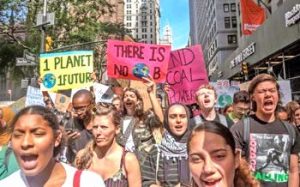
Deadly Heat Shows Capitalism’s Climate Emergency. Communist Masses Must Turn the World Around
July 9— Sebastian Francisco Perez died of heatstroke while working in record high temperatures on an Oregon farm on June 26. The farm owners have been cited three times since 2007 for failing to provide water to the workers and for failing to post information about pesticides and emergency medical care.
Capitalism has many ways to kill us. An increasingly important one is the drastic climate change that it caused and can’t control. That alone shows the urgency of mobilizing for communism, the only fundamental alternative to capitalism. We can’t wait!
During the first week of July 2021, people in the Pacific Northwest region of the USA and Canada saw some of the worst effects of climate change. A phenomenon called a “heat dome” caused a pressure system that created and sustained record-breaking temperatures. In Oregon, 65 people died from the heat. Nearly as many died in Washington State, where temperatures rose to an astounding 115 ⁰F (46 ⁰C).
The mainly indigenous town of Lytton, British Columbia suffered Canada’s highest-ever temperature of almost 50 ⁰C (121 ⁰F) for three days in a row. Then it burned down. A Red Flag reader commented, “As usual, colonizers [imperialists] cause the problem and indigenous people suffer.”
Meanwhile, a chain of tropical storms and hurricanes, like a string of beads, lashed the Caribbean islands and the coastal areas of Florida and neighboring US states.
The negative effects of climate change in the US are far from the world’s worst. Droughts, fires, rising sea levels and floods threaten homes and food supplies from Cape Town to Kerala, from southwest Asia’s Fertile Crescent to Brazil’s Amazonia. They increase the ravages of diseases and aggravate the devastation of war.
Communism Will Liberate the Masses to Answer Climate Crisis
Capitalism’s Industrial Revolution took off 200 years ago, powered by fossil fuels (mainly coal). Working-class districts soon became dirtier, the air almost unbreathable. The capitalist rulers didn’t care about that or working conditions or anything else except maximizing their profits. They still don’t.
Back then, nobody knew the more serious effects of dumping all that carbon into the atmosphere. Oil and later natural gas seemed “cleaner” than coal.
But now scientists have known for almost half a century that these, too, would turn Earth’s atmosphere into a “greenhouse.” That cities like Karachi and Mumbai could become literally too hot for humans to survive.
That global average temperatures would rise and that melting polar ice would increase sea levels. That Pacific island nations like Tuvalu and Kiribati would sink into the ocean. That coastal cities like Kolkata (India), Dhaka (Bangladesh), Guangzhou (China) and Miami (USA) would be swamped.
Humans don’t have to keep pouring carbon into the overheating global greenhouse. Alternative energy sources already exist, and we can create more. In communism we will! There are a million ways we can stop wasting energy. We can redesign communities to make better use of the land that remains livable and cultivable.
It’s only capitalism that stands in the way. Capitalism, and the angry masses’ still-limited ability to imagine the communist world we need. Comrades of the International Communist Workers’ Party must share our vision and plan for communism more broadly, more deeply and more energetically.
Take profits out of the picture and the direst predictions for the rest of this century don’t have to come true. The masses, organized on communist principles to produce and share sustainably for our own collective needs, can turn the world around.
Women Workers, Climate Change and Communism
In many agricultural areas, it is the women who create and cultivate gardens to feed their families and to participate in a local economy. Traditionally, women have contributed by growing and selling food, caring for animals and by producing handmade goods, such as baskets or clothing. These women, who contribute so much, often with unpaid labor, are disproportionately affected by climate change.
An estimated 80% of people displaced by climate change are women and their children. After “natural” disasters, women face higher rates of sexual violence and health problems. They are the primary gatherers of water, food, and fuel. They are the main subsistence farmers, the main cleaners and caregivers. Environmental damage and rising temperatures affect their daily lives and work.
A young woman farmworker in Jacobabad, Pakistan explained, “Even when it’s 52 °C to 53 °C (126-127 °F) we work.”
We shouldn’t be surprised that women and girls are in the front lines of the fight against capitalism’s climate crisis. Fighting government land giveaways to oil companies in Ecuador. Stopping the Dakota Pipeline in the US. Blocking a dam in Honduras that threatened indigenous communities.
From Bangladesh to Sudan, from Nicaragua to Fiji, women are organizing among the masses to create local solutions. Researchers assure us that “women tend to think for the collective whole rather than themselves. Women are shown to make more decisions that support the public good … and encourage honest and ethical behavior.”
That is: Women doubly oppressed by the sexism of class society, and often triply oppressed as members of Black, Indigenous or other marginalized communities, are already living out communist values.
But they need to set their sights higher: beyond protests and reform demands to the revolutionary transformation of society. To the creation of a communist world in which we will together make all decisions for the public good, the collective whole.
A communist world without profits or money to stand in the way of honest and ethical behavior. Without sexism or racism, borders or nations, bosses or exploitation. And, once we have mitigated the capitalist climate disaster, a sustainable world where all can thrive.
We need to redouble our efforts to get to know women and girls like these. And to convince them to join and build the International Communist Workers’ Party.

